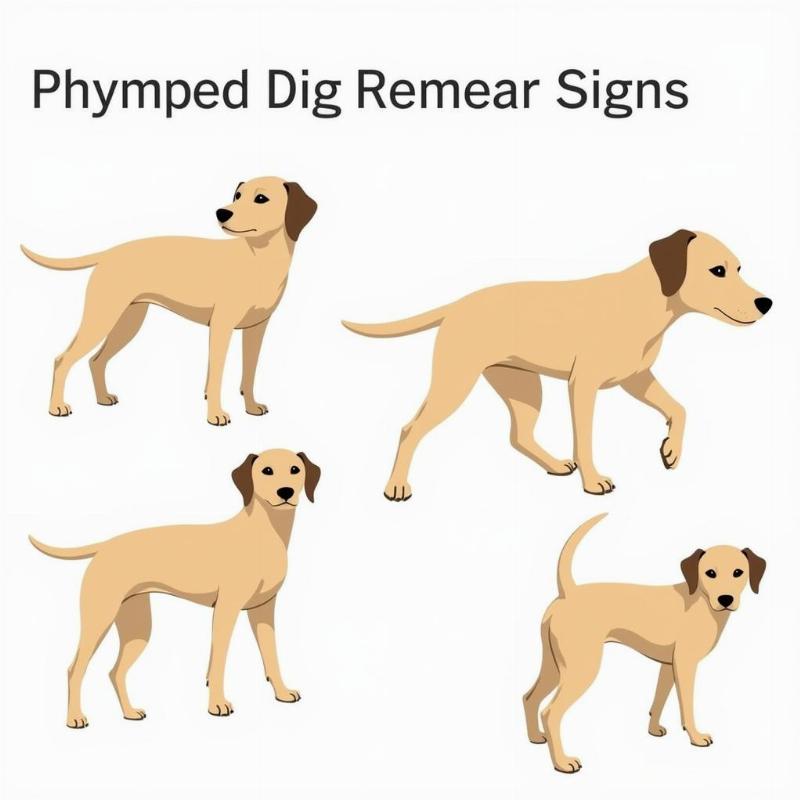Restlessness in dogs at night can be disruptive for both you and your furry friend. Understanding the underlying causes and implementing effective solutions can help restore peaceful nights for everyone. From medical reasons to simple boredom, we’ll explore the common reasons why your dog might be pacing, whining, or unable to settle at night, and provide practical advice on how to address these issues.
Why is My Dog Restless at Night?
There are several reasons why your dog might be experiencing restlessness at night. Identifying the root cause is crucial for finding the right solution. Is your dog a senior experiencing canine cognitive dysfunction? A puppy with an underdeveloped bladder? Or perhaps they’re simply bored and seeking attention? Let’s delve into some common culprits.
Medical Reasons for Nighttime Restlessness
- Pain or Discomfort: Arthritis, injuries, or other medical conditions can cause pain, making it difficult for your dog to get comfortable and sleep soundly. Senior dogs are particularly prone to arthritis.
- Cognitive Dysfunction Syndrome (CDS): Similar to Alzheimer’s in humans, CDS can cause confusion and anxiety, leading to nighttime pacing and vocalization, especially in older dogs.
- Underlying Medical Conditions: Hyperthyroidism, heart conditions, and other illnesses can disrupt sleep patterns.
 Signs of Canine Arthritis
Signs of Canine Arthritis
Behavioral Reasons for Restlessness
- Separation Anxiety: Dogs who experience separation anxiety may become restless and anxious at night when separated from their owners.
- Boredom or Lack of Exercise: A dog who hasn’t had enough physical and mental stimulation during the day may have excess energy at night, leading to restlessness.
- Inconsistent Routine: A lack of predictable bedtime routine can contribute to nighttime restlessness.
- Full Bladder: Especially in puppies, a full bladder can disrupt sleep and lead to whining and pacing.
How to Calm a Restless Dog at Night
Addressing nighttime restlessness requires a multifaceted approach that considers both medical and behavioral factors.
Veterinary Care
- Consult your veterinarian: If you suspect a medical reason for your dog’s restlessness, a veterinary examination is essential to diagnose and treat any underlying conditions.
- Pain management: Your veterinarian can prescribe medications to manage pain and discomfort associated with arthritis or other medical conditions.
Behavioral Management
- Establish a consistent routine: A predictable bedtime routine can help your dog feel secure and reduce anxiety. This could include a final potty break, a quiet playtime, and a consistent sleep location.
- Provide adequate exercise: Ensure your dog gets enough physical and mental stimulation during the day to reduce excess energy at night.
- Create a calming environment: A comfortable bed, a quiet room, and perhaps a white noise machine can help create a relaxing sleep environment.
- Crate training: For some dogs, a crate can provide a sense of security and help reduce anxiety.
Expert Insights
- Dr. Emily Carter, DVM: “It’s crucial to rule out any underlying medical conditions before addressing behavioral reasons for nighttime restlessness. Pain can significantly impact a dog’s ability to sleep.”
- Sarah Miller, Certified Dog Trainer: “A consistent routine, combined with adequate exercise and mental stimulation, can make a world of difference in calming a restless dog at night.”
Conclusion
Restlessness in dogs at night can be a frustrating issue, but by understanding the potential causes and implementing the appropriate solutions, you can help your furry friend sleep soundly and enjoy peaceful nights. Remember, consulting with your veterinarian and a certified dog trainer can provide personalized guidance and support in addressing your dog’s specific needs.
FAQ
- Why does my older dog pace at night? Older dogs may pace due to pain, cognitive decline, or anxiety.
- How can I help my puppy sleep through the night? Establish a consistent routine, ensure they have an opportunity to relieve themselves before bed, and create a comfortable sleep environment.
- Is it okay to let my dog sleep in my bed? While some owners enjoy co-sleeping with their dogs, it can sometimes contribute to separation anxiety or reinforce restless behaviors.
- What are the signs of canine cognitive dysfunction? Signs include disorientation, changes in sleep patterns, increased anxiety, and changes in social interaction.
- Can anxiety medication help my restless dog? In some cases, medication may be necessary to manage anxiety and promote restful sleep. Consult your veterinarian to discuss appropriate medication options.
- How much exercise does my dog need? Exercise needs vary depending on breed, age, and overall health. Consult your veterinarian for guidance.
- What are some calming activities for dogs? Calming activities can include gentle massage, puzzle toys, and quiet playtime.
Suggested Further Reading on Beautdogs.us
(If applicable – Add links to related articles on your website here)
About Beautdogs.us
Beautdogs.us is your premier online resource for all things dog-related in the USA. We provide expert advice on dog breeds, care, and products, offering a trusted source of information for both new and experienced dog owners. Our team of veterinary experts and seasoned dog enthusiasts are dedicated to helping you provide the best possible care for your beloved canine companion. We offer comprehensive guides, product reviews, and practical tips to help you navigate every aspect of dog ownership. For personalized guidance or inquiries, contact our team at [email protected] or call us at +1 501-555-7529.